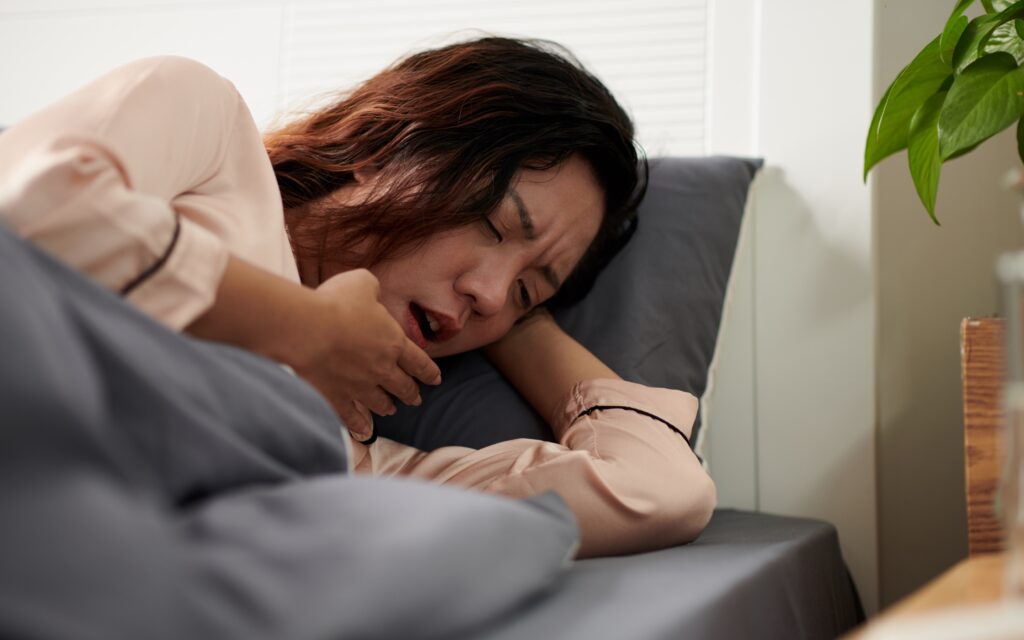Finding sleep positions to stop coughing and generally figuring out how to sleep with a cough can be very challenging. Read on to learn a few tricks about how to have cough free slumber.
Throughout the day, a consistent cough can make it difficult to focus. It can drain your energy, and even lead to discomfort in the form of throat soreness or dryness.
At night, that pesky cough becomes even more problematic. If you’re constantly coughing, your body can’t relax and unwind. This could mean you spend the entire night tossing, turning, and struggling to get a good night’s rest.
The more evenings you spend lying awake, lamenting your cough, the worse your condition may become. After all, the body relies on sleep to heal itself. If you don’t get enough rest, your immune system can suffer, and your symptoms may increase.
Today, we’re going to be looking at some of the best sleep positions to stop coughing. some tips on how you can sleep more soundly with a cough.
Why is my cough worse at night?
Coughing is a relatively common symptom of many acute illnesses and ailments. In fact, it’s a crucial reflex in the human body. When we cough, it’s often a sign our body is trying to rid itself of irritating substances, mucous, and anything else that might impact the airways.
Coughs may be caused by specific diseases, such as cystic fibrosis, COVID-19, whooping cough, and chronic obstructive pulmonary disorder. You can also suffer from a cough as a result of something simpler, like an allergy, asthma, or a simple cold. Some people even cough regularly because their airways are irritated from exposure to smoke and pollution.
There are many different types of coughs, from wet coughs, to dry hacking coughs. Not all of these symptoms will naturally worsen at night. However, many people may find their cough worsens when they lay down to sleep.
The simple reason for this is when you lie flat on your back, it causes mucous to shift in your throat, which prompts the desire to cough.
Lying down also places additional pressure on the windpipe, and can allow stomach acid to flow back up through the body, causing heartburn, and GERD-triggered coughing.
In certain cases, even your sleep environment can make your coughing symptoms worse. If you’re sleeping in an overly dry room, this could irritate and exacerbate a tickly cough.

Do you cough in your sleep? The impact of coughing on sleeping
When you’re fully unconscious, in the deeper stages of your sleep cycle, you may be less likely to continue coughing, as your body will pay less attention to any potential irritants in your throat.
The brain doesn’t necessarily ignore the cough reflex in deep sleep, but you’re less likely to be aware of any discomfort. Unfortunately, it can be difficult to reach the deep stages of sleep with a cough.
If you’re constantly coughing through the light stages of sleep, this will jerk your body awake, and make you more alert.
Eventually, you may still fall asleep with a cough, but your rest period is more likely to be disruptive and disjointed. This could mean you have a higher risk of experiencing the symptoms of sleep deprivation the next day.
Learning the best way to sleep with a cough could be a good way to ensure your body can repair itself faster, and recover from whatever ailment might be causing the cough in the first place. It also ensures you can avoid some of the negative side effects that come with poor sleep, and sleep deprivation.
The best sleep positions to stop coughing
So, what are the best sleep positions to stop coughing?
The exact sleeping position that works best for your condition may vary depending on the nature of your cough. However, most experts will recommend sleeping with your head and neck slightly elevated. You could even sleep sitting up or in a recliner.
Sleeping on your back with no support can cause mucus to build up in your throat, and place additional pressure on your windpipe, which can increase your risk of coughing.
Stacking a couple of pillows under your head, or using a wedge to lift your head up and forwards slightly will help to drain away excess mucus. This is particularly useful if you have a wet cough.
Another option may be to avoid sleeping on your back entirely. While sleeping on your back can offer a lot of benefits in most circumstances, it does place additional pressure on your throat and lungs, which can make respiratory issues a lot worse. Sleeping on your stomach is equally problematic, as it causes greater pressure around your spine and neck.
Side sleeping may be the best option if you’re struggling to get a good night’s rest with a cough, as it helps to keep your airways open. However, there are caveats to keep in mind here.
If your cough is caused by GERD or acid reflux, sleeping on your right-hand side can cause additional coughing. Sleeping on your left can improve the performance of the body’s natural digestion process and minimize the volume of stomach acid which might flow up into your windpipes.

The best way to sleep with a cough: Top tips
Unfortunately, the fact that coughs are such a versatile and changeable ailment means it’s difficult to determine exactly which sleeping strategy will generate the best results for everyone. There’s no one-size-fits-all answer to “what position should I sleep in to stop coughing?”
However, you can take steps to improve your chances of a good night’s rest. First, speak to your doctor. If you’re wondering how to stop uncontrollable coughing at night, your medical care provider should be able to give you some helpful, personalized advice.
They’ll also be able to conduct tests to determine what the cause of the cough might be. Getting to the root of the problem means you’ll be able to get the treatment you need to eliminate the cough once and for all.
Other helpful tips might include:
Use over-the-counter medications
You should always check with your doctor before taking any new medications, but over-the-counter treatments can be helpful for many people. Cough medicines can help to reduce the cough reflex long enough that you’re able to fall asleep. You can also take painkillers and medications for other symptoms of your illness, such as a fever or aches and pains if you have the flu, or a cold.
Try a decongestant
Postnasal drips and congestion can also cause coughing, as well as a build-up of mucus and discomfort around the airways. Steroid nasal sprays and decongestants can be extremely useful for eliminating these symptoms. Just be aware some decongestants can keep you awake. Your doctor may also recommend using antihistamines to help reduce allergic reactions.
Drink warm liquids
Keeping your throat moist with soothing, warm liquids like tea and broth can help to reduce coughing. You could even consider mixing some honey into warm milk or tea. This will help to coat the inside of your throat and prevent discomfort, while naturally killing excess bacteria.
Use a humidifier
If the reason for your cough is dry air or nasal congestion, a humidifier could be an excellent investment. Just keep in mind that humidity can make other issues causing coughs a lot worse. For instance, humidity might lead to increased asthma symptoms, or worsen an infection in certain cases.
Wash and clean your bedding
One of the most common causes of a chronic cough is allergies. Blankets, sheets, pillowcases, and curtains can attract common allergens like dander, dust and even pollen. The more you’re exposed to these substances, the more your discomfort and symptoms are likely to grow. Washing your bedding on a regular basis, and using anti-allergenic bedding is a good way to tackle the problem.
How do I stop uncontrollable coughing at night?
There’s no one-size-fits-all strategy when it comes to figuring out how to sleep with a cough. Choosing the right sleeping positions to stop coughing, such as lying on your side and elevating your head can reduce some of your symptoms. However, you may find simply changing positions doesn’t solve the issue entirely. With that in mind, it’s always best to speak to your doctor.
Your medical healthcare professional will be able to find out the root cause of your cough, so they can offer more personalized treatment recommendations. For instance, they may tell you to drink more fluids, or try an oral antihistamine. If your cough is getting worse, to the point where you simply can’t sleep at all, then your doctor might advice using a cough suppressant.
Cough suppressants are medications which can block the cough reflex during the night, making it easier to fall asleep, and get a good night’s rest.
Siestio. Sleep Matters.
Medical disclaimer
You must not rely on the information provided on our website as an alternative to medical advice from your doctor or other healthcare professionals. For more information read our full disclaimer here.







